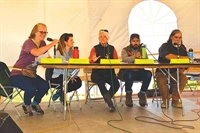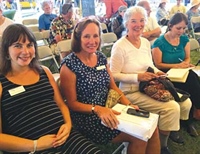Climate Change in Maine
The Problem, the Response and What All of Us Can Do
September 2020
Climate Change in Maine – View or download our 4-page resource guide
Researchers continue to amass a tidal wave of scientific evidence showing the inextricable links between industrial activities and chaotic weather patterns. It’s getting harder to deny that planet Earth is warming and humans are responsible for it. The clock is ticking and we need to take meaningful action to ensure a healthy and vibrant future for all of us, with a fine point on the next generations of organic farmers, gardeners and consumers.
Though greenhouse gas emissions attributed to Maine’s agricultural sector do not come close to those from transportation, MOFGA contends that organic management practices have an important role to play in mitigation and adaptation strategies for climate change.
Three Climate Action Steps For MOFGA Supporters
- Maximize local, organic foods in your diet. It’s good for your health, good for the health of the climate and Maine’s environment, and good for the health of our agricultural economy.
- Invite members of the Maine Climate Council to meet with your organization or community.
- Talk with your elected representatives at the municipal, state and federal levels and let them know that you want bold and swift action to address the climate crisis.
Pesticides: In the News and All Around Us
Who decides which pesticides can be approved for use – are these “forever” decisions?
Saturday, September 21, 2019
This teach-in focused on how pesticides are evaluated by state and federal authorities. Pesticides are available for sale in hardware, grocery and farm stores as well as greenhouses. All are toxic to varying degrees. Homeowners can buy many pesticides, but some are available only to licensed professionals. Many farmers count on pesticides to meet their bottom line and would be challenged to farm without them. By law, organic farmers cannot use most synthetic pesticides, so they continuously adjust farming practices to manage rising disease and insect problems. Meanwhile, homeowners are at the short end of the process – not knowing how to determine what is least toxic, what alternative controls might be used, why a pesticide is on the market and what they can do to be involved.
The teach-in brought together panelists who have been directly involved in the pesticide journey. They provided an overview of the regulatory process, explained the role of the federal Environmental Protection Agency (EPA), the Maine Board of Pesticides Control (BPC), our legislature, our communities and you.
Our outstanding panel included Sharon Tisher, J.D, who teaches environmental law and policy at the University of Maine, is a past president of MOFGA, reported on the Maine BPC for The Maine Organic Farmer & Gardener for many years and is the author of the Pesticides Quiz; Jay Feldman, executive director of Beyond Pesticides and a frequent Common Ground Country Fair speaker; Carol L. Hubbard, M.D., who works in developmental and behavioral pediatrics at Maine Medical Partners; and Nancy Ross, Ph.D., an adjunct professor of political science at the Southern Maine Community College, retired professor of environmental policy at Unity College, former deputy commissioner at the Maine Department of Conservation and former executive director of MOFGA. We will learn about the work of federal and state staff who are expected to serve the public and respond to diverse constituents.
Today’s Agriculture – An Important Piece of Maine’s Economic Development Strategy
Saturday, September 22, 2018
The Public Policy Teach-in, co-hosted in 2018 by MOFGA’s Public Policy Committee and Maine Farmland Trust (MFT) at the Common Ground Country Fair, focused on creating an agricultural platform for Maine’ next governor. The teach-in is posted on YouTube.
Panelists were Ellen Stern Griswold, MFT policy and research director; Penny Jordan of Jordan’s Farm in Cape Elizabeth and president of Maine Farm Bureau; Ben Whalen, co-owner of Bumbleroot Organic Farm in Windham, MOFGA Journeyperson (JP) Program graduate, member of the Southern Maine Young Farmers Coalition and former board officer of farmers’ markets in Kittery and Saco; and Jim Gerritsen of Wood Prairie Family Farm in Bridgewater, president of the Organic Seed Growers and Trade Association (OSGATA), past MOFGA board member and one of the earliest MOFGA-certified organic farmers.
Making America Green Again: A Workshop in Resistance
Saturday, September 23, 2017
What threats does the Maine environment now face from rollbacks in Washington, D.C.? How can Mainers fight back? Decisions made in the U.S. capital can harm the clean waters, fresh air, healthy forests and thriving wildlife of Maine, as well as the health of Maine people and our way of life. Right now the Trump administration and its allies are pursuing the most aggressive environmental rollbacks in U.S. history. Attacks on federal laws that protect our climate, public lands, air and water as well as attacks on the agencies that administer these laws could set us back decades. These threats, if implemented, would cause serious harm nationwide and would be particularly damaging for states such as Maine, where our environment and economy are tightly intertwined. Extreme cuts to Environmental Protection Agency protections that reduce pollution in Maine, save the lives of Maine people and strengthen our communities and economy would harm both our environment and economy. At the 2017 teach-in, organized by MOFGA’s Public Policy Committee, three experts described the threats we face and ways to fight back. A Q&A session followed their presentations.
Local Pesticide Control: How Your Town Can Protect Health and the Environment
Saturday, September 24, 2016
With a 700-percent increase in the distribution of home-use pesticide products in Maine in recent years, 1 what are citizens’ options when state and federal governments are not adequately protecting our health and the environment from these toxic chemicals?
Maine is fortunate to be one of seven states that allow towns to create local laws that are more restrictive than state or federal laws. Currently, 26 Maine municipalities have passed ordinances tailored to the special needs of their communities and restricting pesticide use beyond state requirements. 2 The most comprehensive, in Ogunquit, prohibits outdoor pesticide application on public and private property. South Portland and Portland are considering similar prohibitions.
Our 2016 Teach-In featured the cofounder of a national advocacy organization, the sustainability coordinator for one of Maine’s largest cities, a local activist, a town conservation commission chair, a director of a conservation organization and a physician. Hear how they are helping their communities better protect themselves from pesticide exposure.
Citations:
1 Source: Maine Board of Pesticides Control
2 https://www.maine.gov/dacf/php/pesticides/public/municipal_ordinances.shtml





